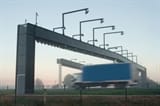Wisconsin needs to face the reality of declining fuel-tax revenue and transition to per-mile charges
Despite bipartisan legislative support, Gov. Tony Evers vetoed the Legislature’s plan for a $2.5 million study of the potential of tolling and per-mile charges as replacements for declining fuel tax revenues. Both the governor and legislative supporters of the vetoed plan have some misconceptions that, ironically, underscore why such a study is needed.
To begin with, Evers is in denial about the coming decline in per-gallon fuel tax revenue. In his veto message, he wrote that “the motor fuel tax is the most effective way to approximate a user fee of roadway use.” Two national commissions appointed by Congress in the last decade concluded, based on ample evidence, that the revenues from federal and state fuel taxes would soon enter a long-term decline. The reasons for this include federal fuel-economy regulations that, as they get ever-more stringent, will let petroleum-fueled cars go two, three or four times as far per gallon used. As those vehicles replace older vehicles in the coming decades, total U.S. fuel-tax revenue could decrease by $35 billion per year (as of 2040). If you add to that the possible penetration of electric vehicles, the shortfall could be $45 billion per year by 2040.
The Departments of Transportation in more than a dozen states are operating pilot projects to test various ways of charging for miles driven, rather than gallons consumed. The idea would be to phase out per-gallon fuel taxes and phase in per-mile charges — a funding source independent of a vehicle’s means of propulsion. Every U.S., European, Japanese and Chinese producer of cars and trucks is developing electric vehicles. If those vehicles catch on in a big way, a per-mile charge will be essential if we wish to continue the sensible policy of having roadway users pay for the costs of our highways. Wisconsin is in no way prepared for this eventuality.
One early step toward charging per mile rather than per gallon would be to use the revenues from all-electronic tolling to rebuild and modernize Wisconsin’s aging Interstate highways. Nationally, Interstates and other limited-access freeways handle more than one-third of all vehicle miles of travel. So if those major highways were switched from fuel taxes to per-mile tolls, that would be a big start on the needed transition.
In 2016, a study was done of the revenue potential of Wisconsin Interstate tolls, at the direction of the Legislature. It included a primer on 21st century tolling, which is all-electronic, based on windshield transponders (like I-PASS in Illinois) or license-plate imaging. The study was promising enough that the Legislature in 2018 authorized a Phase 2 study, to estimate what it would cost to rebuild and selectively widen Wisconsin’s Interstates, how this compares with projected toll revenues and how to navigate the federal approval process. Then-Gov. Scott Walker vetoed that plan, and this year’s repeat effort was just vetoed by Evers.
The need for this additional study was illustrated by statements made on Wisconsin Public Radio by two legislative supporters of tolling. Assembly Assistant Majority Leader Mary Felzkowski (R-Irma) said that federal restrictions permit tolling only for new lanes added to Interstates. She also referred to “toll booths,” which are not part of 21st century tolling. But as documented in the Phase 2 tolling study in Indiana last year, federal law permits the replacement of bridges on non-tolled Interstates with tolled bridges, and that is how Indiana’s plan for toll-financed Interstate replacement would proceed. (On average, there is about one bridge per mile on the Interstate highway system.) A Wisconsin Phase 2 study would make this clear.
Assembly Minority Leader Gordon Hintz (D-Oshkosh) expressed concern that tolling could be “inefficient” if not all of the revenue from tolls went directly to needed highway projects. But that is entirely up to the Legislature. Per-mile tolls on Interstates should be dedicated exclusively to the cost of rebuilding, widening, operating and maintaining these critical corridors. To be sure, some state legislatures (e.g., Pennsylvania’s) have treated toll roads as cash cows, diverting large sums of toll revenue to other purposes (transit subsidies, in Pennsylvania’s case). That is contrary to a fair and sensible policy of users-pay/users-benefit.
In short, Wisconsin needs to face reality on transportation funding. Per-gallon fuel taxes are poised for a long, terminal decline over the next 20 to 30 years. Instead of waiting for this to start hurting its transportation budget, Wisconsin needs to start figuring out how it will go about replacing per-gallon fuel taxes with per-mile charges. The vetoed study was an appropriate first step.
Robert W. Poole Jr. is director of transportation policy at Reason Foundation and author of Rebuilding and Modernizing Wisconsin’s Interstates with Toll Financing. He is a visiting fellow at the Badger Institute.





